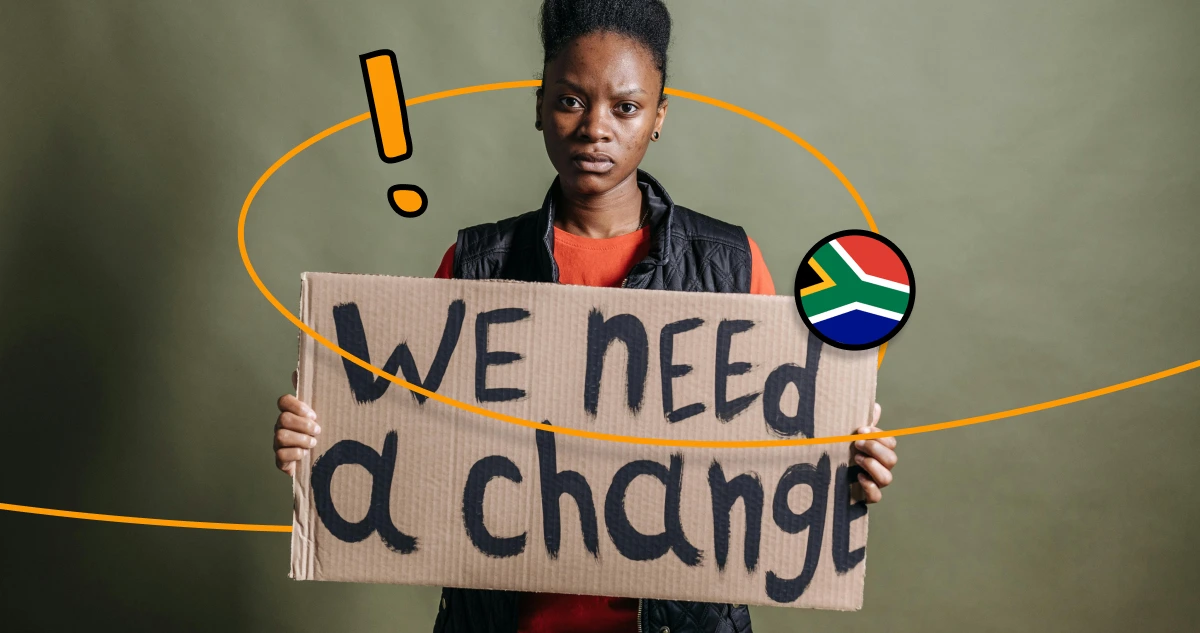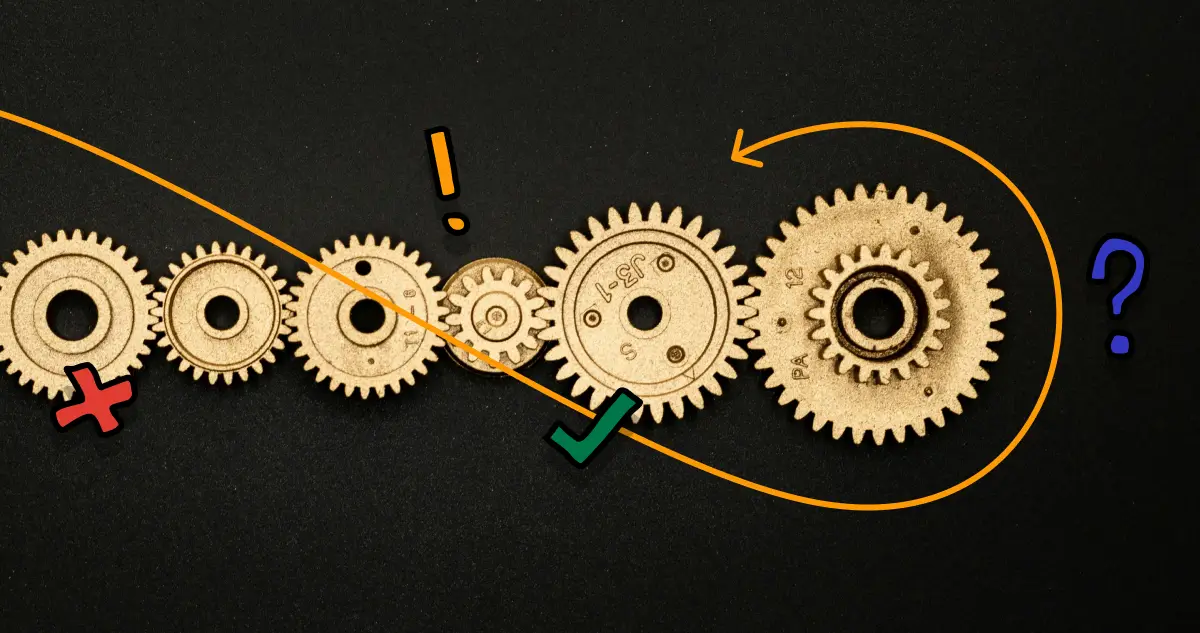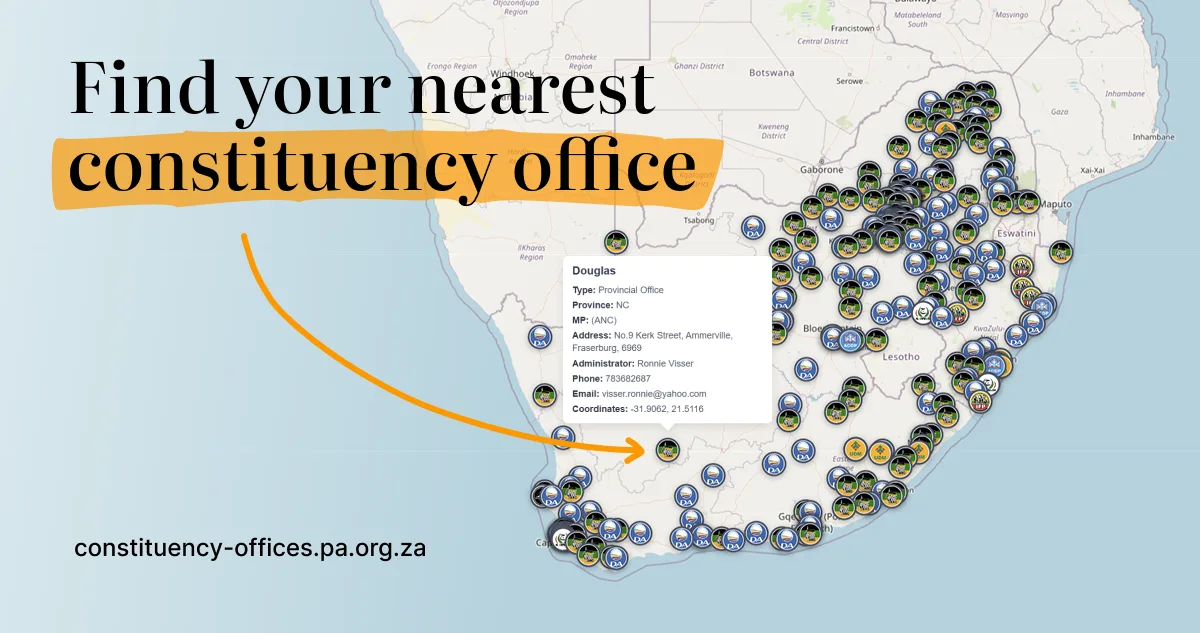What is the current state of youth representation in parliament, and what are key challenges and opportunities according to young MPs.
Youth representatives in parliament
In South Africa’s 7th Parliament, 8.5% of the seats in the National Assembly (NA) are held by youth, defined as individuals aged 18-34.*That is only 33 out of the total 387 occupied seats.*
In South Africa’s 7th Parliament, 8.5% of the seats in the National Assembly (NA) are held by youth
This is similar to 2021, where PMG found that 30 members of the NA (9%) were youth (35 and younger).**
The most populated age group in the NA is the 45-54 age group, with 104 (26.9%) MPs, while the 55-64 group is right behind with 103 (26.6%) MPs.
Makeup of National Assembly via age categories
* The data in this document is as of 12 June 2025. Due to the regular turnover of MPs, the data can change at any given time.
* This was calculated from June 16 2025
** The 2021 study's classification of Youth was 35 and below, rather than 34. Additionally, the study did not include Deputy Ministers of Ministers, and as such, looked at 342 MPs. This study included Ministers and Deputy Ministers.
.webp)
23 of the youth MPs in the National Assembly are serving in the national legislature for the first time, while 10 have prior experience in the previous Parliament.
One youth MP chairs a parliamentary committee.
Out of the 33 youth MPs, the largest number come from the African National Congress (ANC) with 14, followed by the Democratic Alliance (DA) with 9, and the Economic Freedom Fighters (EFF) with 5.
However, when looking at the proportion of youth MPs relative to each party’s total seats, the EFF leads among the five largest parties, with 13.2% of its MPs being youth. The DA and ANC follow with 10.3% and 8.9%, respectively. Notably, ActionSA—though smaller—has the highest overall proportion in the National Assembly, with 16.6% of its seats held by youth representatives.
Percentage of party MPs who are youth
*Parties marked with asterisks have not filled all their designated seats in the NA. These calculations used party-filled seats, rather than total designated seats.
Of the 33 youth MPs in the NA, 17 (51.5%) are male, while 16 (48.5%) are female.

The youngest Member of Parliament (MP) is Jasmine Shanon Petersen from the Patriotic Alliance (PA), who is 23 years old.
At the time of writing, we could not confirm the data for the National Council of Provinces (NCOP)
The Inter-Parliamentary Union (IPU) underscores the significance of youth inclusion in legislatures, arguing that “the exclusion of youth from Parliament is not only unjust but has important policy implications.” As the IPU points out, young people “will live longest with the consequences of legislation passed today,” yet without their participation, laws are unlikely to reflect their priorities, such as education, unemployment, and climate change.
The IPU has set a target of 15% for youth representation in Parliaments across the world (IPU’s classification of youth is anyone under 30, rather than 34).
Norway had the highest percentage of youth represented in its national legislature, with 13.6%, in the IPU’s 2023 report on youth representation across global Parliaments.
In an effort to shift this imbalance, the IPU has identified six ways that could change this, few of which South Africa already has in place.
- Promoting youth quotas – legislated or voluntary measures to ensure youth candidates are nominated.
- Aligning eligibility age for office with voting age – reducing barriers to candidacy.
- Creating youth-focused parliamentary structures, such as a youth caucus or committee.
- Empowering young parliamentarians with dedicated resources, platforms, and training.
- Mentorship programmes – to support young aspirants in navigating political pathways.
- Campaigns for greater youth participation – engaging civil society and political parties alike.
Youth caucuses are typically cross-party groups of young MPs who work together to advocate for youth issues and amplify young people’s voices in legislative processes. The P20 Youth initiative, hosted by Parliament, will hopefully serve as a catalyst towards establishing a youth caucus and promoting the youth agenda.
In South Africa, there are no legislated youth quotas. This means that in the current policy environment, political parties must prioritise young people in their nominations to serve in Parliament.
While representation is key, Parliament plays a significant role in youth development by:
- Legislation: Enacting laws and policies that impact youth, such as education, employment, and health.
- Oversight: Holding the government accountable for implementing youth-related policies and programmes.
- Budget allocation: Approving budget allocations for youth development initiatives and programmes.
- Advocacy: Promoting youth issues and concerns, and advocating for their rights and interests.
An interview with young MPs
We spoke to two youth MPs, Mlondi Mveli Mdluli of the DA, and Mbali Dlamini from the EFF, on their experiences being young MPs in South Africa’s national legislature.
1. What do you see as the main barriers to youth representation in Parliament? Did you face any of these challenges on your path to becoming an MP?
Dlamini: Parliament receives deployments from Political Parties. My political party, the Economic Freedom Fighters (EFF), has been very intentional and deliberate in ensuring youth representation and our caucus has the biggest representation of young people both male and female. We are encouraged and trusted with responsibilities that shape us into being reliable and dependable public representatives
2. What are the benefits of having more young MPs in Parliament?
Dlamini: The benefits would be that any long-term policy or legislative position process needs energetic and passionate people to witness the cycle in its entirety. When you are young, that’s when you are the most productive, and that productivity needs to be used.
3. Is there currently a youth caucus in Parliament, or are there any plans to establish one? What benefit (if any) do you think this could bring?
Dlamini: No, there is none that has been formalised that we are part of.
4. Does Parliament provide adequate support and empowerment for young MPs? If so, how? If not, what could be improved?
Dlamini: There is no targeted support that is tailored specifically for young people, however we do get support of skills which comes in the form of academic support of which we are encouraged to take part in by our EFF caucus
5. What ideas do you have for better integrating young people into the work of parliamentary committees?
Dlamini: Young people in parliament need to use social media platforms to dissect and make the process of law-making more palatable, such as starting a podcast that speaks to the day-to-day challenges of young people. Most importantly, it is imperative to remain grounded so that we are not desensitised to the realities young people face.
6. Are there specific youth-related issues you are championing, and how do you plan to drive impact in these areas?
Dlamini: Yes, the biggest challenge faced by the youth is mass unemployment, and we have gone through parliamentary processes to champion more formalised and secure employment streams, with clear strategies and accredited skills development.
7. What do you see as the main barriers to youth representation in Parliament? Did you face any of these challenges on your path to becoming an MP?
Mdluli: One of the greatest barriers to youth representation in Parliament is not simply access, but the lack of a clear and supported pathway to readiness. Young people are often excluded from structured opportunities to build the experience and skills necessary for effective public leadership.
I encountered many of these challenges on my own journey. Entering political spaces traditionally dominated by older, more established figures required persistence, credibility, and a great deal of patience. Earning trust and demonstrating that I could shoulder responsibility took time and deliberate effort. A pivotal moment for me was being selected for the Democratic Alliance’s Young Leaders Programme in 2021. The programme offered targeted leadership development, mentorship, and policy training, all anchored in a values-based framework. Most importantly, it helped me build the confidence, strategic thinking, and professional network essential for growth as a public servant.
Without initiatives like this, many capable young leaders are left to navigate a complex political system alone. That’s why I strongly advocate for greater and more intentional investment in youth leadership, both within political parties and across broader public and civic institutions.
8. What are the benefits of having more young MPs in Parliament?
Mdluli: There are clear benefits to having more young MPs, but those benefits only materialise if youth representation is matched by substance, critical thinking, and a sound grasp of governance. Age is not a qualification. If we treat youth as a credential in itself, we risk weakening the very institutions we seek to strengthen.
What Parliament needs are capable young leaders who bring fresh perspectives underpinned by technical competence. Young MPs must be able to interrogate policy frameworks, analyse budgets, understand macroeconomic trade-offs, and offer viable, evidence-based alternatives. That requires more than passion; it requires training, education, and a commitment to continuous learning.
When young MPs combine academic grounding with practical experience, they are uniquely placed to challenge outdated thinking, drive innovation, and lead long-term reform. This is especially important given that many of today’s policy decisions on climate change, industrialisation, education reform, and the digital economy will only bear fruit decades from now. Competent young MPs bring a long-term perspective that is often missing from short-term political cycles.
9. Is there currently a youth caucus in Parliament, or are there any plans to establish one? What benefit (if any) do you think this could bring?
Mdluli: To my knowledge, there is currently no formal, functioning youth caucus in the South African Parliament.
In principle, such a caucus could be valuable, but only if it is grounded in substance, not symbolism. We should be cautious not to create yet another platform for performative politics. A youth caucus that becomes an echo chamber of slogans and identity politics risks reinforcing a culture of low expectations.
However, if properly designed, a youth caucus could drive policy innovation, support skills development, promote inter-party collaboration, and facilitate peer-to-peer learning. It could serve as a forum for young parliamentarians to develop technically sound proposals on issues that disproportionately affect young South Africans, such as unemployment, education reform, digital infrastructure, and entrepreneurship.
A well-structured caucus could also function as a pipeline of excellence: identifying and mentoring future public leaders based on intellectual rigour, policy knowledge, and a commitment to service. It could partner with universities, think tanks, and civil society to host policy roundtables, publish position papers, and develop legislative proposals.
Participation in such a caucus should be based not just on age, but on a demonstrated commitment to education, legislative impact, and policy depth. We must cultivate a culture of reading, analysis, and evidence-based thinking among young MPs. Only then will such a platform be meaningful.
10. Does Parliament provide adequate support and empowerment for young MPs? If so, how? If not, what could be improved?
Mdluli: Parliament does provide a range of formal support systems, including administrative assistance, logistical resources, and access to researchers.
One of the most valuable yet underutilised resources is the education funding available to MPs, which covers undergraduate and postgraduate studies at South African institutions. This creates a significant opportunity for continuous learning and intellectual development, particularly for young MPs who are still building their policy foundations.
However, we need to go further. Parliament should actively encourage more MPs, especially young ones, to pursue further education and foster a culture that values evidence-based thinking and analytical skills. True empowerment lies not just in access, but in preparation, and education is central to that.
We should institutionalise mentorship programmes, expand links with policy think tanks, and provide structured training in economics, public finance, and legislative drafting. Being an MP today requires more than passion; it demands technical knowledge and strategic insight.
11. What ideas do you have for better integrating young people into the work of parliamentary committees?
Mdluli: If we are serious about integrating young people into the work of Parliament, especially in committees where much of the detailed legislative and oversight work happens, we must prioritise structured, merit-based engagement over symbolic inclusion.
One practical approach is to create formal shadowing opportunities for university students and recent graduates in fields such as law, economics, finance, public policy, engineering, and environmental science. These individuals could be paired with MPs or committee staff, offering firsthand exposure to parliamentary work while also contributing fresh insights.
Recently, I hosted a young man who had just completed his matric at Michaelhouse and has a strong interest in politics, agricultural policy, and small business development. He shadowed me in Parliament for a week and gained insights well beyond what textbooks can offer. He will be heading to New Zealand in July to begin his undergraduate studies. Experiences like these, especially when extended to students from diverse backgrounds, can foster early engagement in public service.
Committees should also consider holding youth-focused public evidence sessions, not as token events, but as platforms for technically proficient young people to present research and solutions in areas where they are already leading, such as green technology, digital innovation, or youth entrepreneurship.
Importantly, not all youth should be included simply because they are young. The standard must be competence, preparation, and a genuine willingness to contribute. Our goal should be to equip young people not only to participate, but to lead with both vision and skill.
12. Are there specific youth-related issues you are championing, and how do you plan to drive impact in these areas?
Mdluli: Yes. My primary focus is on youth economic empowerment, approached through the lens of deep structural reform rather than short-term programmes. Too often, youth policy in South Africa has been reduced to slogans, stipends, and scattered initiatives that fail to address the systemic barriers excluding young people from the economy.
As a Member of the Trade, Industry and Competition Portfolio Committee, I focus on overseeing policies that create sustainable economic opportunities. I believe we must shift from the narrow objective of “creating jobs for youth” to building an economy where young people can create value, lead innovation, and compete globally.
I advocate for expanding youth access to high-productivity sectors such as advanced manufacturing, green industries, agro-processing, renewable energy, and knowledge-intensive services like ICT and data science. These sectors represent the future of our economy, and we must ensure young South Africans are integrated into them, not just as workers, but as innovators and leaders.
I also champion small enterprise development, with a specific focus on reducing barriers that prevent skilled young entrepreneurs from succeeding. This includes reforming procurement processes, cutting red tape, and improving access to finance, infrastructure, and technology, particularly in rural and township economies.
Economic transformation cannot occur without changing who gets to participate in wealth creation. That means equipping young people with the tools, knowledge, and institutional support to become producers in the economy.
This is a long-term endeavour that requires policy consistency, a sound industrial strategy, and the courage to challenge systems that entrench inequality. But if we are serious about empowering youth, we must build an economy that rewards education, skill, and innovation, and enables the next generation to lead with purpose.

Work with us
We are looking for resource and data partners!
If you or your organisation would like to contribute or collaborate, please get in touch.
You might also like

Global Ethics Day 2025 and South Africa's Parliament

What goes into Monitoring Parliament? Behind the scenes with PMG’s Monitors!






